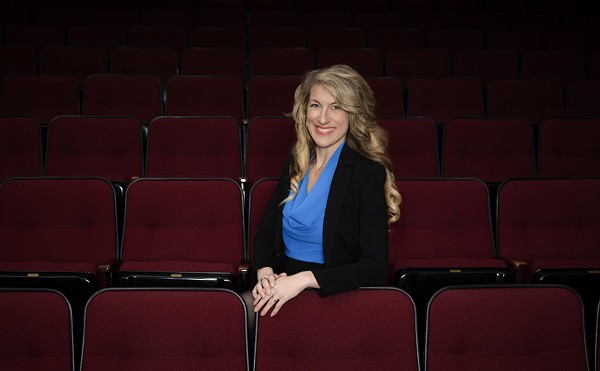Benjamin Britten's Gloriana, the story of the love-hate relationship between Queen Elizabeth I and Robert Devereux, Earl of Essex, is a vast and intricate blueprint. It's based on real events that took place in the mid-1500s in Elizabethan England. The blueprint calls for a large orchestra playing very complex music, over which fourteen different vocalists, solo and in various combinations, and a gigantic chorus representing the Elizabethan court must sing very difficult melodies -- some while dancing with ballet dancers. Gloriana's libretto steers clear of overwrought and simplistic drama. It depicts complex emotion. The people portrayed are real human beings, not operatic "characters" or symbols. Colin Graham, longtime artistic director of Opera Theatre of Saint Louis, has taken up the challenge posed by Gloriana, which opened at the Loretto-Hilton theater this past Wednesday night.
Graham knew what he was getting into: He'd experienced the black cloud that long hung over this opera. He was up in the nosebleed seats when Queen Elizabeth II, offended by the public airing of her namesake's amorous peccadilloes, walked out of Gloriana's 1953 première. As it was being staged as part of Liz II's coronation festivities, much of the audience was made up of the international diplomatic corps, who walked with her. The critics took the opportunity to punish Britten for his pacifist objections to World War II and his openly gay lifestyle (Britten and his life partner, tenor and librettist Peter Pears, were the Elton John and Bernie Taupin of opera in an era in which homosexuality was against the law) by panning the opera. Ten years later Graham was involved as a participant when Gloriana was finally revived in celebration of Britten's 50th birthday, November 22, 1963 -- the day John F. Kennedy was assassinated. Three years later Graham played a key role in the Sadler's Wells Opera Company version of Gloriana, which finally established it as a major work and led to its much-belated American première in 1984. He brings all this experience and a loving touch to the St. Louis production.
Britten's score is a thick and feisty stew of modern rhythm and orchestration layered with Elizabethan-sounding melodies. Steuart Bedford, who worked with Britten for many years, was brought in to conduct. Bedford is one of Britten's best-known collaborators, and his intimacy with this music is immediately apparent. He meticulously draws every ounce of nuanced drama from the score. Under his baton, melodies and countermelodies spice each other; rhythms and counter rhythms pulse against one another. The result is staggeringly beautiful. But it is only the foundation on which the singers' and dancers' performances are built.
As Elizabeth, Christine Brewer, a soprano with a deep and luscious tone, is so sure of her skills that she's able to surrender herself fully to the character. The music inhabits her. Brewer uses her seemingly effortless ability to sing and act intricate emotions to artfully draw the conflict between Elizabeth, sovereign head of state and Elizabeth, a woman in love with a man 30 years her junior. It's a rare performance, free of histrionics or melodrama. Likewise, Brandon Jovanovich as Essex is all ambition and callow youth with his buddies, yet 100 percent yearning lover when with the queen.
Their performances stimulate equally confident renderings by the large cast that interacts with them. Foremost among these is Steven Condy, as Sir Robert Cecil, Elizabeth's Karl Rove, who gets to sing such pithy lines as, "The art of government is in procrastination, silence and delay." Morris D. Robinson, a big man with a massive, blow-'em-away basso who earlier personified absolute evil as the assassin Sparafucile in Rigoletto, turns plaintive here as the blind ballad singer.
William Plomer's script is witty and wise. The sets are basic and functional in the stripped-down style common to repertory Shakespeare, but they're effective. The costumes reflect the elegance of Elizabeth I's fashion-conscious court. The total effect is technical, spiritual and artistic unity.





